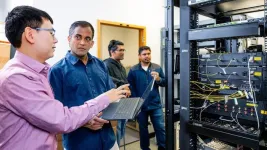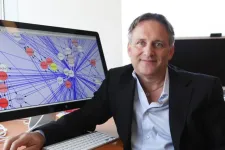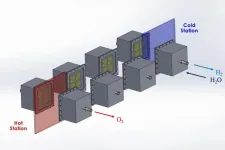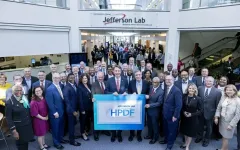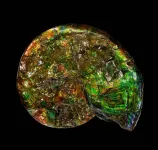(Press-News.org) Quantum networks hold enormous potential for groundbreaking advances in many areas of science and technology. Once this technology matures, it is expected to be an essential component of quantum computing. It could have the equivalent impact as the internet has had on digital communication.
The U.S. Department of Energy (DOE) has announced that three collaborative projects in quantum networking will receive $24 million for up to three years. The DOE’s Argonne National Laboratory will be participating in two of the projects and leading one of them, InterQnet. Anticipated funding for InterQnet is $9 million over three years.
Quantum networks would lead to breakthroughs in quantum computing by linking multiple quantum computers to greatly boost computational power. This technology could also advance precision measurements based on quantum principles that would otherwise not be possible. And it could pave the way for new applications yet to be conceived.
“Our results will serve as the bedrock for scaling up quantum networks to connect quantum devices around the nation.” — Rajkumar Kettimuthu, computer scientist
The InterQnet project will address multiple challenges with scaling up quantum networks from the current metropolitan scale to much longer distances and more complex architectures. To that end, Argonne is collaborating with DOE’s Fermi National Accelerator Laboratory (Fermilab), Northwestern University, the University of Chicago and the University of Illinois Urbana-Champaign.
The quantum processes involved govern the behavior of elementary particles, such as photons, which are the fundamental constituents of light. The key process is called entanglement. Two entangled particles are interdependent even after they are separated over vast distances.
“What fascinates me about quantum networks is that they can transport information in a fundamentally new way,” said Rajkumar Kettimuthu, a computer scientist at Argonne and principal investigator for InterQnet. “They allow you to communicate quantum information from one point to another in a network by leveraging quantum entanglement while also transmitting classical information; this is different from transmitting the quantum information over a communication medium, such as a fiber-optic cable, or free space.”
He further explained that because entanglement-based quantum communication requires transmittal of classical information from source to destination, you cannot communicate quantum information faster than light.
“We have already demonstrated quantum communication with entangled photon pairs in a laboratory, between buildings at Argonne, and between Argonne and Fermilab,” Kettimuthu said.
InterQnet will be showcasing quantum communication across five buildings on the Argonne campus with multiple distinct quantum platforms and an early-stage quantum repeater. Each platform will use a different type of quantum bit (qubit), the basic unit of information in quantum information. Unlike classical bits, which can only be either 0 or 1, a qubit can simultaneously represent a combination of both states. This characteristic is one reason quantum computers possess vastly superior computational capabilities for some applications.
Argonne researchers previously collaborated in the development of four types of qubits: electrons, ytterbium atoms, charged erbium atoms (ions) and microwave circuits. A significant milestone would be to demonstrate the Argonne quantum network connecting these distinct qubit platforms. One of them would serve as a quantum repeater, an essential network element to extend the communication distance.
“Our results will serve as the bedrock for scaling up quantum networks to connect quantum devices around the nation,” Kettimuthu said. The team will complement practical experiments with computer simulations to determine the optimal architecture for a futuristic quantum network scalable to great distances.
This new project grew out of work done in various earlier and ongoing projects. These include several Argonne Laboratory Directed Research and Development projects; the Illinois Express Quantum Network (IEQNET) led by Fermilab; and Q-NEXT, a DOE Office of Science national quantum information science (QIS) center led by Argonne.
InterQnet will also leverage various existing QIS hardware and software elements already in place. These include the fiber-optics connection between Argonne and partner institutions and a quantum network simulator developed at Argonne.
Fermilab has been awarded DOE funding for a separate project, Advanced Quantum Network for Scientific Discovery. This Fermilab-led project will leverage the expertise and capabilities developed by IEQNET. The objective is to improve the transmission of information over quantum networks. Collaboration between the two national labs will continue as Argonne will also participate in the project along with other partners.
“Quantum networks are the foundation for distributed and scaled-up quantum computing, which has potential applications in banking, national security, energy delivery infrastructure, information security and many others,” said Panagiotis Spentzouris, associate laboratory director for emerging technologies at Fermilab.
The DOE Advanced Scientific Computing Research program is funding this research.
Argonne National Laboratory seeks solutions to pressing national problems in science and technology. The nation’s first national laboratory, Argonne conducts leading-edge basic and applied scientific research in virtually every scientific discipline. Argonne researchers work closely with researchers from hundreds of companies, universities, and federal, state and municipal agencies to help them solve their specific problems, advance America’s scientific leadership and prepare the nation for a better future. With employees from more than 60 nations, Argonne is managed by UChicago Argonne, LLC for the U.S. Department of Energy’s Office of Science.
The U.S. Department of Energy’s Office of Science is the single largest supporter of basic research in the physical sciences in the United States and is working to address some of the most pressing challenges of our time. For more information, visit https://energy.gov/science.
END
Argonne to receive new funding to develop quantum networks
Unlocking the future of information transmission
2023-10-16
ELSE PRESS RELEASES FROM THIS DATE:
Hillman grant for Penn Nursing professor to study virtual reality & loneliness
2023-10-16
PHILADELPHIA (October 16, 2023) – Penn Nursing, with partners from the Annenberg Virtual Reality ColLABorative and New York University’s Rory Meyers College of Nursing, have been awarded 2023 grant from the Hillman Emergent Innovation: Serious Illness and End of Life program to study the use of social virtual reality (VR) in enhancing the treatment experience and reducing loneliness in people undergoing hemodialysis. This grant is awarded by The Rita and Alex Hillman Foundation.
Hemodialysis is a life-saving treatment for people experiencing ...
High-performance ICUs reduce mortality rates during pandemics and other health crises
2023-10-16
A new study published by CHEST Science Journal shows that high-performance intensive care units (ICUs) might also have better patient outcomes during health crises. The study used as a benchmark the mortality rate observed in Brazilian ICUs before and during the COVID-19 pandemic, and analyzed data from over 380,000 patients of private hospital ICUs across 10 Brazilian states. The research was coordinated by the D'Or Institute for Research and Education (IDOR) and concluded that the mortality rate during the pandemic was significantly reduced in ICUs that exhibited high efficiency before the pandemic.
The COVID-19 ...
Information about abortion care largely omitted or buried on 80% of health systems’ patient-facing websites
2023-10-16
Embargoed for release until 5:00 p.m. ET on Monday 16 October 2023
Annals of Internal Medicine Tip Sheet
@Annalsofim
Below please find summaries of new articles that will be published in the next issue of Annals of Internal Medicine. The summaries are not intended to substitute for the full articles as a source of information. This information is under strict embargo and by taking it into possession, media representatives are committing to the terms of the embargo not only on their own behalf, but also on behalf of the organization they represent.
----------------------------
1. Information ...
Andrea Califano receives Alfred G. Knudson award from NCI
2023-10-16
Andrea Califano, Dr, has been honored with the 26th Alfred G. Knudson Award in Cancer Genetics by the National Cancer Institute (NCI) for his exceptional contributions to the field of cancer research. Califano, a pioneer in the field of cancer genetics, is the Clyde and Helen Wu Professor of Chemical and Systems Biology at Columbia University Vagelos College of Physicians and Surgeons and a member of the Herbert Irving Comprehensive Cancer Center.
The award is named in honor of geneticist and cancer researcher Alfred G. Knudson, MD, a 1947 graduate of the Vagelos College of Physicians and Surgeons, who helped uncover several major genetic mysteries behind ...
Learning more about how cancer affects stroke risk
2023-10-16
Patients with a previous or current cancer diagnosis are more likely to have a stroke than the general population, but how are specific cancers and treatments associated with stroke risk?
A collaborative team led by University of Cincinnati, University of North Carolina (UNC) and Duke University researchers is seeking to answer that question.
Soma Sengupta, MD, PhD, now division chief of neuro-oncology at UNC, had the idea to study the prevalence of stroke in patients with different cancer types while a faculty member at UC. She recruited a team that included stroke experts Stacie Demel, DO, PhD, of UC and Wuwei Feng of Duke to put together a retrospective pilot study.
“This ...
MIT design would harness 40% of the sun’s heat to produce clean hydrogen fuel
2023-10-16
MIT engineers aim to produce totally green, carbon-free hydrogen fuel with a new, train-like system of reactors that is driven solely by the sun.
In a study appearing today in Solar Energy Journal, the engineers lay out the conceptual design for a system that can efficiently produce “solar thermochemical hydrogen.” The system harnesses the sun’s heat to directly split water and generate hydrogen — a clean fuel that can power long-distance trucks, ships, and planes, while in the process emitting no greenhouse gas emissions.
Today, hydrogen is largely produced through processes that involve natural gas and other fossil fuels, ...
Fungal infection in the brain produces changes like those seen in Alzheimer’s disease
2023-10-16
Previous research has implicated fungi in chronic neurodegenerative conditions such as Alzheimer’s disease, but there is limited understanding of how these common microbes could be involved in the development of these conditions.
Working with animal models, researchers at Baylor College of Medicine and collaborating institutions discovered how the fungus Candida albicans enters the brain, activates two separate mechanisms in brain cells that promote its clearance, and, important for the understanding of Alzheimer’s disease development, generates amyloid beta (Ab)-like peptides, toxic protein ...
Jefferson Lab to lead $300+ million high performance data facility hub
2023-10-16
NEWPORT NEWS, VA – The U.S. Department of Energy has just announced the selection of Thomas Jefferson National Accelerator Facility as the lead for its new High Performance Data Facility Hub. Jefferson Lab will partner with DOE’s Lawrence Berkeley National Laboratory to form a joint project team led by Jefferson Lab. The HPDF will be a $300-500 million computing and data infrastructure resource that will provide transformational capabilities for data analysis, networking and storage for the nation’s research enterprise. ...
VA study provides new insights into COVID-19 pandemic death rates
2023-10-16
A multi-institutional team of researchers led by the White River Junction VA, and including the West Haven and Palo Alto VA, analyzed electronic health record data from more than 5.9 million Veterans―spanning both pre-pandemic (March 2018 - February 2020) and pandemic (March 2020 - February 2022) periods―to discover nuanced insights from COVID-19’s impact on mortality rates.
While former studies have primarily relied on aggregate data, this research―published in the October 2023 issue of the International Journal of Epidemiology―offered a unique perspective ...
Leading scientists, philosophers identify nature’s missing evolutionary law
2023-10-16
A paper in the prestigious Proceedings of the National Academy of Sciences today describes “a missing law of nature,” recognizing for the first time an important norm within the natural world’s workings.
In essence, the new law states that complex natural systems evolve to states of greater patterning, diversity, and complexity. In other words, evolution is not limited to life on Earth, it also occurs in other massively complex systems, from planets and stars to atoms, minerals, and more.
Authored by a nine-member team — leading scientists from the Carnegie Institution for ...
LAST 30 PRESS RELEASES:
A biological material that becomes stronger when wet could replace plastics
Glacial feast: Seals caught closer to glaciers had fuller stomachs
Get the picture? High-tech, low-cost lens focuses on global consumer markets
Antimicrobial resistance in foodborne bacteria remains a public health concern in Europe
Safer batteries for storing energy at massive scale
How can you rescue a “kidnapped” robot? A new AI system helps the robot regain its sense of location in dynamic, ever-changing environments
Brainwaves of mothers and children synchronize when playing together – even in an acquired language
A holiday to better recovery
Cal Poly’s fifth Climate Solutions Now conference to take place Feb. 23-27
Mask-wearing during COVID-19 linked to reduced air pollution–triggered heart attack risk in Japan
Achieving cross-coupling reactions of fatty amide reduction radicals via iridium-photorelay catalysis and other strategies
Shorter may be sweeter: Study finds 15-second health ads can curb junk food cravings
Family relationships identified in Stone Age graves on Gotland
Effectiveness of exercise to ease osteoarthritis symptoms likely minimal and transient
Cost of copper must rise double to meet basic copper needs
A gel for wounds that won’t heal
Iron, carbon, and the art of toxic cleanup
Organic soil amendments work together to help sandy soils hold water longer, study finds
Hidden carbon in mangrove soils may play a larger role in climate regulation than previously thought
Weight-loss wonder pills prompt scrutiny of key ingredient
Nonprofit leader Diane Dodge to receive 2026 Penn Nursing Renfield Foundation Award for Global Women’s Health
Maternal smoking during pregnancy may be linked to higher blood pressure in children, NIH study finds
New Lund model aims to shorten the path to life-saving cell and gene therapies
Researchers create ultra-stretchable, liquid-repellent materials via laser ablation
Combining AI with OCT shows potential for detecting lipid-rich plaques in coronary arteries
SeaCast revolutionizes Mediterranean Sea forecasting with AI-powered speed and accuracy
JMIR Publications’ JMIR Bioinformatics and Biotechnology invites submissions on Bridging Data, AI, and Innovation to Transform Health
Honey bees navigate more precisely than previously thought
Air pollution may directly contribute to Alzheimer’s disease
Study finds early imaging after pediatric UTIs may do more harm than good
[Press-News.org] Argonne to receive new funding to develop quantum networksUnlocking the future of information transmission
